Top 160+ Real Estate Keywords To Attract Buyers & Sellers
Welcome to our guide on the top real estate keywords attracting buyers and sellers. As a realtor, you must understand what your clients are searching for online and the specific terms or keywords they use. Take a moment to consider things from your clients’ perspectives.
What are they usually looking for online when it comes to real estate? What are the questions they will need answers to? What do they need to know before contacting you or other agents? What media, platforms, and channels will they likely use to seek answers?
In this guide, we’ll provide over 160 real estate keywords that will help you optimize your content and attract the right audience. By understanding the keywords your clients are searching for, you can create valuable, engaging content that will educate and inform them.
Whether you’re a seasoned real estate professional or just starting, this guide will be invaluable for your business. So, let’s dive in and explore the top real estate keywords that will help you attract and retain clients.
Why SEO Real Estate Keywords Matter
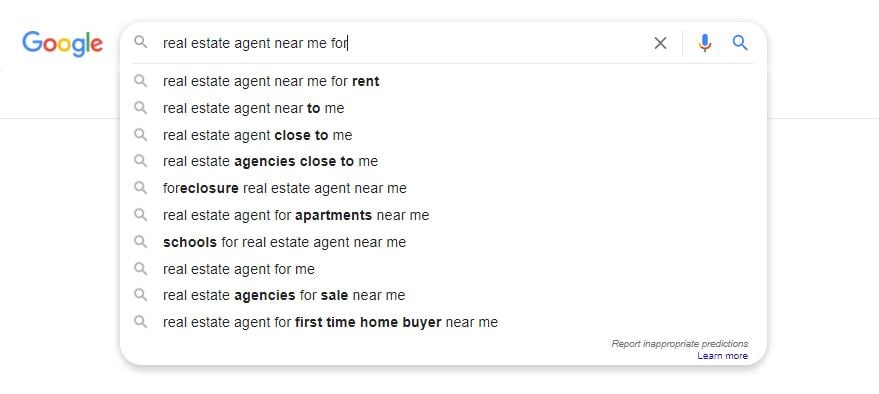
Did you know that 97% of homebuyers use the Internet to look for a property? This explains why 43% of recent buyers visited search engines to explore new properties for sale. Capitalizing on real estate keywords has become more critical than ever with real estate going digital.
Keywords and phrases are the words or groups of words your audience is looking up online when it comes to real estate — in the language they use while typing in their search. They could represent topics, specific information, or answers to their questions.
- Topics: direct buying, seller financing, commercial real estate lending.
- Specific information: housing prices, US housing market, real estate as an investment.
- Questions: what is industrial real estate, how much do real estate agents make, and when is the best time to sell a house?
Keeping track of real estate keywords or real estate hashtags helps you ensure that the content on your blog and website captures some of that search intent. You can engage with prospects that find your content through search engines. These users are essential because they are more willing to engage — after all, they actually found answers to their questions through your content.
As such, creating content that your audience finds valuable and entertaining is not enough. You must ensure you understand and write with your target audience in mind. So researching keywords and staying on top of people’s search intent is necessary as you plan and craft your content.
What Are Real Estate SEO Keywords You Should Be Targeting?

The real estate industry is highly competitive. That’s why, as an agent, you should know everything about SEO for Real Estate. Moreover, realtors should aim for long-tail, specific keywords because these have a higher chance of conversion. Long-tail keywords are more specific and targeted, meaning that people searching for them are more likely to seek what the realtor is offering actively. They usually are not the keywords with the highest search volume, but they are the ones with low competition or the lowest keyword difficulty (KD).
By including specific details such as the name of a city or neighborhood (hyperlocal keywords), realtors can also help their website rank higher for local search queries. This can increase visibility on search engine results pages and attract potential clients looking to buy or sell a home in that area. Realtors can attract more qualified leads to their sites by targeting long-tail keywords.
Here are some must-use examples:
- “Homes for sale in [city or neighborhood]“: This is an excellent long-tail keyword that can help you target people actively looking to buy a home in a specific area. Including the name of the city or neighborhood in the keyword can also help your website rank higher for local search queries.
- “Real estate agents in [city or neighborhood]“: If you’re a real estate agent, this is a vital keyword to target. By optimizing your website for this keyword, you can help potential clients find you when they’re searching for a local agent.
- “Best neighborhoods in [city]“: This keyword can effectively target people researching different areas to live in. By creating content highlighting the best neighborhoods in your city, you can attract people in the early stages of the home-buying process.
- “Real estate market trends in [city or state]“: This keyword can effectively target people interested in the real estate market in a particular area. By creating content that analyzes market trends and provides insights into the local real estate market, you can position yourself as an expert in your field and attract potential clients.
160+ Best Real Estate Keywords Ideas To Grow Your Business
Remember: Add the keyword “in [city/state name]” to attract specific local searches in your area.
For example: “Home for sale in Miami, Florida.”
Popular General Keywords
- Real estate
- Real estate near me
- Real estate for sale
- Real Estate listings
- Realtor
- Best Realtor in [city name]
- Real Estate Agent
- Real Estate Brokerage
- MLS Listings
- Realty
- Investment property
- Commercial real estate
- Residential real estate
- Real estate agents in [city name]
Real Estate Buyers Keywords
- Home for sale
- How to buy a home
- New homes for sale
- Property for sale
- House for sale
- Luxury homes for sale
- Apartment for sale
- Cheap Houses For Sale
- Mortgage
- Zillow Properties
- Home buying
- House to buy
- Home to buy
- Home search
- Real estate agency
- Real estate listings
- Best real estate agents
- Real estate investment
- Mortgage rates
- Open House near me
- Open Houses
- How to get a mortgage
- How to improve your credit score
- Affordable homes for sale
- Down payment assistance
- Mortgage pre-approval
- Mortgage calculator
- Move-in ready homes
- Home financing options
- Homeownership benefits
- Homeownership education
- Home buying process
- Home buying checklist
- Home affordability calculator
- Real estate broker
- Real estate agent fees
- Home inspection checklist
- Home warranty
- Homeowners Insurance
- Homeowner association fees
- Property taxes
- Foreclosure
- Home maintenance tips
- Home buying mistakes to avoid
- Home buying vs. renting
Real Estate Keywords for First-Time Buyers
- First-time homebuyer
- First Home buying mistakes to avoid
- First-time homebuyer programs in [city/state name]
- Affordable homes for first-time buyers in [city/state name]
- How to save for a down payment on your first home
- First-time homebuyer grants in [city/state name]
- How to choose the right neighborhood for your first home
- First-time homebuyer mistakes to avoid
- How to negotiate your first home purchase
- How to finance a home as a first-time buyer
- First-time homebuyer tax credits in [city/state name]
- How to find a real estate agent for first-time buyers
Real Estate Sellers Keywords
- How to sell a home
- Sell your home
- Sell your house
- Sell your apartment
- Real estate appraisal
- Real estate broker
- Best real estate company
- Best real estate agent
- Real estate marketing
- Home Appraisal
- Home valuation
- Home staging tips
- Home selling process
- Home selling checklist
- Home selling fees
- Home selling commission
- Real estate marketing strategies
- Real estate listing agent
- Home improvement tips
- Home renovation ideas
- Curb appeal tips
- Preparing your home for sale
- Pricing your home to sell
- Negotiating home offers
- Closing costs
- Moving Checklist
- Top real estate agents in [city name]
- Best time to sell your home
- Selling your home as-is
Trending Real Estate Keywords
- Virtual open house
- Virtual tours
- 3D home tours
- Smart home technology
- Sustainable homes
- Co-living spaces
- Smart home
- Eco-friendly homes
- Co-living
- Co-working
Real Estate Investment Keywords
- Real estate crowdfunding
- Real estate development
- Rental property investment
- Commercial property investment
- Real estate investment trusts (REITs)
- [City name] Real estate market trends
- [City name] Property management
- Real estate market trends
- Real estate investment opportunities
- Real estate investment strategies
Real Estate Renters Keywords
- Home for rent
- House for rent
- Property for rent
- Apartment for rent
- [City name] rentals
Real Estate Local Keywords
- Real estate [city name]
- [City name] Homes for sale
- [City name] real estate agent
- [Zip code] Homes for sale
- Houses for sale in [City name]
- [City name] real estate market
- [City name] real estate listings
- [State] Best neighborhoods for families
Listing or Property Keywords
These keywords are perfect for searching for a specific type of properties.
- Luxury homes
- Waterfront property
- Single-family homes
- Condos for sale
- Townhomes for sale
- Fixer-upper homes
- [City name] homes for sale with a pool
- [City name] homes for sale with a view
- [City name] homes for sale with a garage
- [City name] homes for sale in a gated community
- [City name] homes for sale with a large backyard
- [City name] homes for sale with a guest house
- [City name] homes for sale with solar panels
- [City name] homes for sale near [popular attraction]
- [City name] homes for sale in a top-rated school district
- [City name] homes for sale with a fireplace
- [City name] homes for sale with a balcony or terrace
- [City name] homes for sale with a home office
- [City name] homes for sale with a gourmet kitchen
- [City name] homes for sale with a wine cellar
- [City name] homes for sale with a pool house
- [City name] homes for sale with a tennis court
- [City name] homes for sale with a home theater
- [City name] homes for sale with a gym or fitness room
- [City name] homes for sale with a backyard oasis
- [City name] homes for sale with a chef’s kitchen
- [City name] homes for sale with a private beach access
Real Estate Lead Generation Keywords
- Contact a real estate agent
- Find a real estate agent
- Free home valuation
- Free home appraisal
- Home Buyer’s Guide
- Home Seller’s Guide
- Exclusive listings
- Real estate newsletter
How to Monitor Real Estate Keywords

Staying on top of real estate keywords is essential for any real estate agent or business. It is not a one-and-done endeavor. It implies doing your research on an ongoing basis and finding new ways to capture some of that search demand. To this end, there are some tools and tactics you can use to optimize and update your real estate keyword strategy on an ongoing basis.
1. Use Google Results to Get Started
Many real estate agents invest heavily in keyword research or SEO tools to find out what Google tells them — for free. When you type in a search, keep an eye out for the results in your search engine. To this end, check out the search suggestions, the top pages, people also ask (PAA), or related searches.
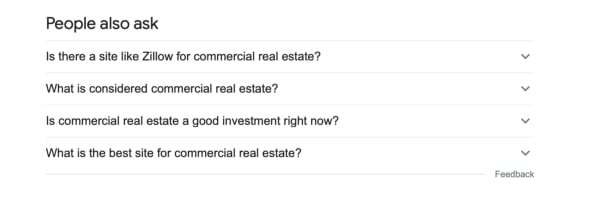
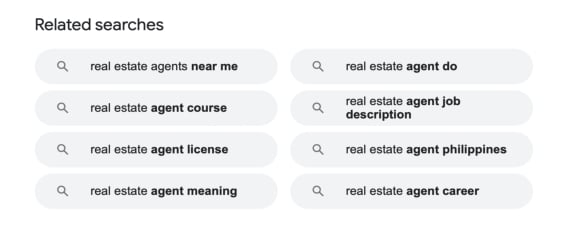
However, you should remember that these are extensive searches and might not be very indicative of your audience. Nonetheless, it’s a good starting point for your keyword research.
Consider using a keyword tracking tool to monitor your real estate keywords over time. Tools like Ahrefs and SEMrush can help you keep track of your keyword rankings and identify new opportunities for optimization. By tracking your progress over time, you can make data-driven decisions to improve your real estate keyword strategy and achieve your goals.
2. Leverage Free Chrome Extensions to Zero In on Your Searches
SEO Chrome extensions are a fantastic way to get more data from your real estate searches. They can help you better understand the intent of your target audience and gain more insights into what they are searching for. Additionally, they are easy to use, take up less space, and cost less than paid tools.
One great example of a free Chrome extension is Keyword Surfer. This tool allows you to see the estimated search volume for a keyword and the cost per click for your ad campaigns. You also get keyword ideas you can use to rank better. This free tool lets you optimize your real estate keyword strategy and stay ahead of your competition.
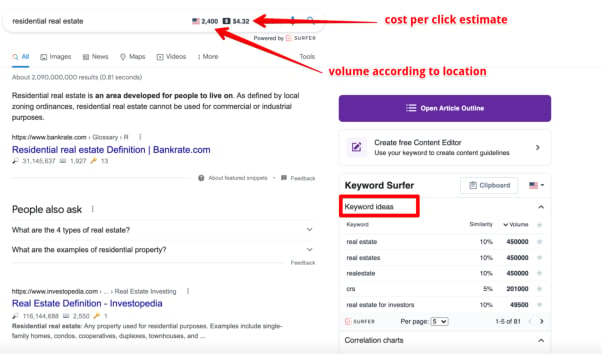
3. Monitor Your Competitors’ Activity
If you’re new to real estate and looking to grow your business fast, your competitors might help you get your SEO strategy. Monitoring their strategies can help you keep up with industry trends and identify potential competitive advantages. To this end, you can look at their current content strategy and social media activity, analyze their most performing content, and monitor the keyword they’re already ranking for.
One tool you can use to monitor your competitors’ keywords is Ubersuggest. By entering your competitor’s domain, you can see the number of keywords they rank for, the monthly organic traffic, the domain authority, and the number of backlinks. Additionally, you can see the top SEO pages and keywords. By analyzing your competitors’ keyword strategy, you can learn from their successes and mistakes and optimize your real estate keyword strategy accordingly.
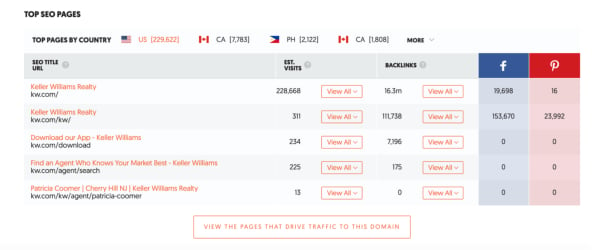
4. Keep Up with SEO Trends and Best Practices
We’ve said it before — keyword research is not a one-and-done endeavor. You must watch for emerging keywords and topics to capture search traffic quickly. And keyword research is nothing without a proper understanding of SEO best practices. You can check out Moz, Search Engine Land, or State of Digital to develop your SEO skills.
To identify new trends and market opportunities early on, you can use Exploding Topics. This tool allows you to spot under-the-radar topics before they actually take off. By using it, you’ll always be one step ahead when it comes to keyword research.

5. Learn to Measure Your Success
Measuring your success is as important as optimizing your real estate keyword strategy. You need to understand what works and what doesn’t and be clear on what you’ll measure and how.
The best way to get started with this stage is through Google Analytics. It allows you to see where your audience is coming from, how long they stay on your website, and where exactly they go. Moreover, you can also measure specific conversions like newsletter sign-ups, lead magnet downloads, and so on. You’ll also see the keywords you’re already ranking for.
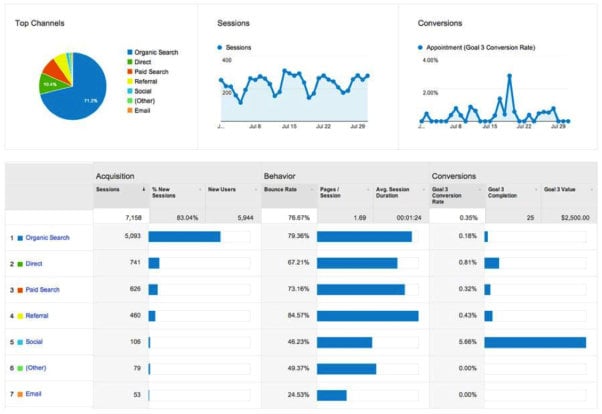
Google Search Console is a powerful tool to help realtors improve their SEO strategy. Using Google Search Console, realtors can optimize their websites and target the keywords most relevant to their business. Google Search Console is a free tool provided by Google. It provides insights into their website’s performance on Google search results, including the keywords driving traffic.
Realtors can see each keyword’s or page’s clicks, impressions, click-through rates, and average positions. This information can help realtors identify which keywords are driving traffic to their site and which ones are not. Realtors can use this information to optimize their website for the keywords that are performing well. They can create content relevant to those keywords and optimize their website. They can also identify gaps in their content and create new content to target keywords that are not performing well.
In addition to checking their real estate keywords, they can verify their website’s mobile friendliness and performance, which are critical points for SEO.
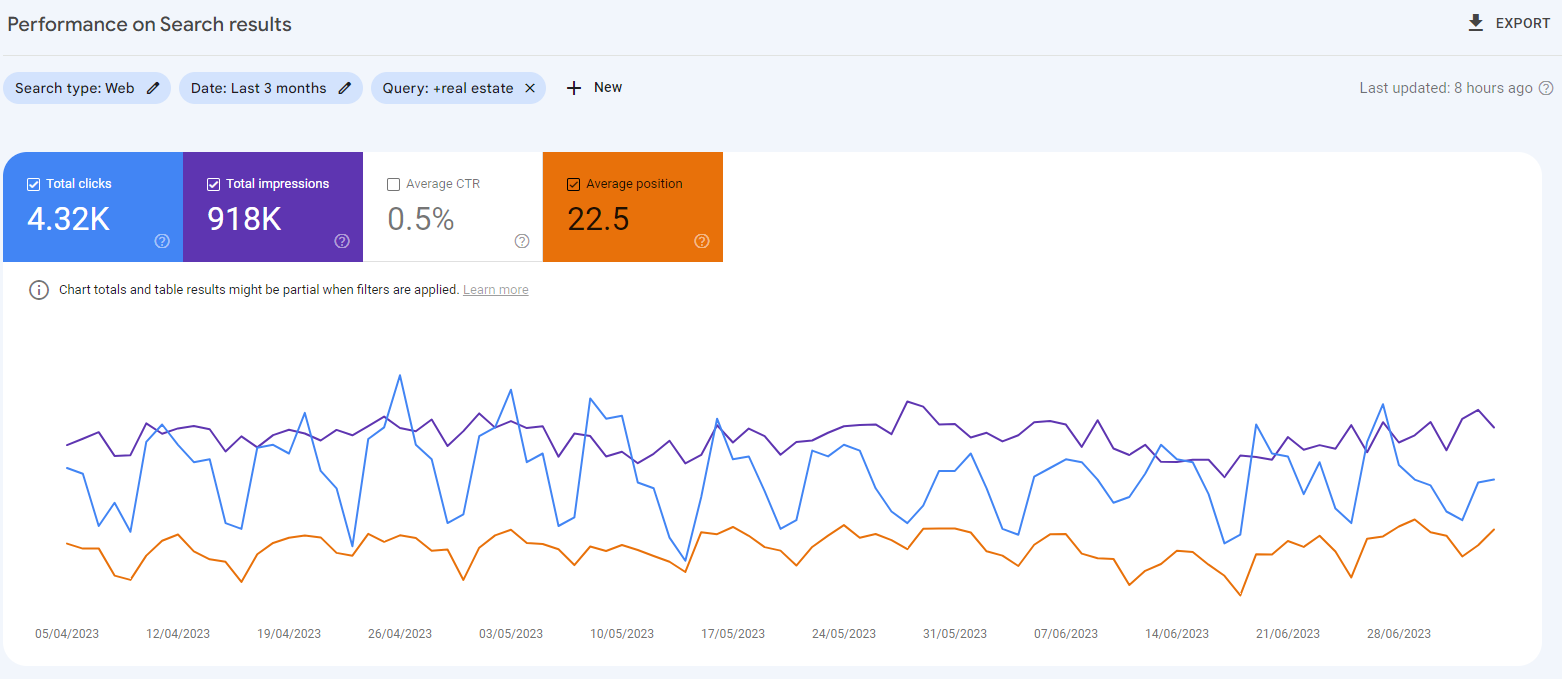
Conclusion
It’s also important to note that targeting keywords isn’t enough to succeed with SEO. You also need to create high-quality content that provides value to your audience. This can include blog posts, videos, infographics, and real estate marketing materials. Creating content people want to engage with can improve your website’s visibility and attract more traffic and leads.
Creating fresh marketing materials for real estate is intuitive and easy with Xara Marketing Center for Realtors. Sign up now and start designing marketing collateral that gets your listings sold!

Try Xara Cloud for 14 days and discover
the results
- No credit card or phone number required.
- Start creating instantly — 1 minute signup.